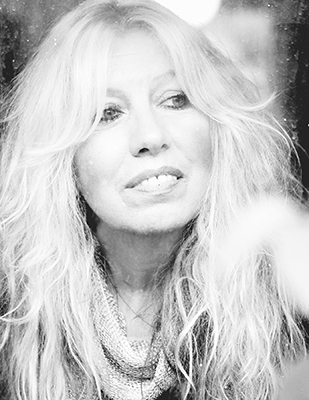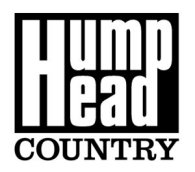Judie Tzuke

Judie Tzuke News
'Full Moon - The Complete Collection' is out now
Judie Tzuke Links
Judie Tzuke Albums
Judie Tzuke Biography
Judie Tzuke
Moon On A Mirrorball
“I have to think it’s all possible or I might as well stop, and I don’t want to stop now.”
Marking 30 years since Judie Tzuke first found herself in the British pop charts, Moon On A Mirrorball is less a retrospective and more a bookmark on a career that shows no sign of quietening down. Bookended by tracks made for Elton John’s Rocket label and songs that bring the story up to date, it’s a collection that contains 40 reasons why she remains one of Britain’s most successful songwriters.
Best known for Stay With Me Till Dawn (the tune with which a young DJ called George Michael always closed his sets and voted the 39th best British song of the previous 50 years in a poll marking the Queen’s golden jubilee in 2002), Tzuke’s life encompasses Glastonbury headline slots in the company of Jackson Browne (“I had the throat from hell,” she says, “but he was my hero, so I miraculously recovered.”) and playing to 400,000 in New York, but this is a collection on which her 16 studio albums all play a part and on which the most recent recordings are as important as the old hits.
In the 1970s, Judie was courted by Island, the hippest label of the era, but spurned their advances; her first single was released on Good Earth, a label owned by David Bowie’s producer, Tony Visconti. In the 1980s, she was one of the top five bestselling British female artists; in the 1990s, she became a pioneering independent act, recording her own songs in her own studio and releasing her albums on her own label. The new millennium found her back in the charts, but as the co-writer responsible for hit by the likes of Lucie Silvas.
So don’t call this a comeback. For Tzuke, this is a time for looking forward, not dwelling on past glories. “I don’t like the bitterness that comes from a lot of musicians my age. I have to work in my own world where everything is possible, where I could write a song that gets played on Radio 1 tomorrow. The new project I’m working on better get on Radio 1. I refuse to think it’s not possible. There are a lot of comebacks going on, but I’m not part of that.”
While a quarter of Moon On A Mirrorball comes from the three albums she recorded for Elton John’s Rocket label at the start of her career, just as many come from her two most recent albums (Songs 1 and Songs 2) and her vault of new material. “These were songs I’d written not specifically for me to record, but I did them because I like them. The Songs 1 recordings (The Cup Of Tea Song, All At Sea, Temporary) were like a bunch of demos; Songs 2 (Won’t Do It Twice, Faith, Break Your Skin) was more rocky, a band album; I’ve easily got a Songs 3 and probably Songs 4, but I have to get them in a bunch that go together well.”
Though it’s ungallant to remind her about the thirtieth anniversary, there are highlights to be discussed - and not always in the most obvious way. “Somebody told me it was 30 years and I really didn’t know that. Then a friend put together a night of people singing my songs to me. They and the audience were looking at me as if to say: ‘Is that all right?’ It was very strange but lovely and totally appreciated.”
Judie’s career began at Rocket: “They were fantastic. Their plan was to develop young artists and put them on a wage, which sounded pretty fantastic to me because I didn’t feel ready to be out there, but I didn’t know how to do anything else.” The first single, For You, was a radio hit; the second, Stay With Me Till Dawn, which was written the same night, was a smash (“I don’t think anybody really expected that.”), as was the subsequent album, Welcome To The Cruise. “I love the songs from that album and the playing. Although it’s 30 years old, it sounds really good.”
Two more albums, Sportscar and I Am The Phoenix, came out on Rocket before Judie left for Chrysalis, where she recorded Shoot The Moon and Ritmo, from which rerecorded versions of, respectively, Late Again and How Do I Feel, have made it onto Moon On A Mirrorball. “Ritmo is very 1980s sounding, but I think you could put it on now and like it more, because that sound is right back in fashion now. It’s funny how you get used to certain sounds at different times.”
The next album, The Cat Is Out, was her first on an independent label, and, as if predicting a future DIY ethic, How Sweet It Is was recorded in her bedroom. Five years followed before Turning Stones, which featured Let Me Be The Pearl and We’ll Go Dreaming. “I love that album, but at first they made me work with a producer I didn’t know. I made a whole album and I didn’t like it, but he wouldn’t listen to me and kept telling me it was because I was pregnant that I wasn’t hearing things right.” Fortunately, the record company preferred the original demos and insisted she went back and remade the album as she wanted it to be.
“That’s the problem with being on major labels: you kind of have to compromise and I’ve never been very good at that. I stand by all of my albums and I’m very proud that I’ve never sold out. Obviously, there was a lot of pressure to and had I done I might have been more successful, but the way I have it now is the way I can sleep at night and make music that I’m proud of.”
There was one more release on a major label, Left Hand Talking, which contained Liam and the title track; then Wonderland, often cited as her personal favourite, began an unbroken relationship with independence. “It was a one-off and we got some really interesting musicians like Nigel Kennedy and Brian May on there and did something different for songs like Fly and Vivienne. It was the start of a new kind of thing for me. I began to be where I wanted to be.”
Four years later, Under The Angels was the first album to appear on Judie’s own label, Big Moon, for whom she has been recording at the rate of an album ever two or three years ever since. “We have our studio and we are able to go down and just do what we want and hope people like it. Once we had the studio, the musicians and our independence, we were steaming away.” Few artists would have the confidence to call their fourteenth album 2004’s The End Of The Beginning, but that’s exactly what it was to her.
The past four years have been some of Judie’s busiest - when she’s not on MySpace searching for new, unsigned talent, she’s working with young artists such as Tom Baxter, David Saw and Lucie Silvas. Her enthusiasm for modern music and contemporary acts makes her a refreshing alternative to the gloom merchants who think pop music is doomed. “It’s almost as if everybody thinks they have to win The X Factor to achieve fame, and that would have been the uncool way to do it in my day. It means new bands, who would once come through naturally, have to go down the same funnel if they want to get deals, and I think that’s terrible. There is nothing wrong with the programme but there have to be other platforms. There are some amazing young people out there who just need places to play and people to hear them. We are just in a funny place at the moment but I’m battling away to make it right.”
Covering three decades of creativity, Moon On The Mirrorball offers Tzuke’s own perspective on her battles and her triumphs as a work in progress. “I haven’t really come to terms with the fact that it is 30 years yet. Compilations in the past have tended to be put together without our involvement, but this is our thing. I wanted something new on it, so it really is from then till now. I don’t want to be thought of as a 1970s, 80s or 90s artist. I’m just doing what I do.”









